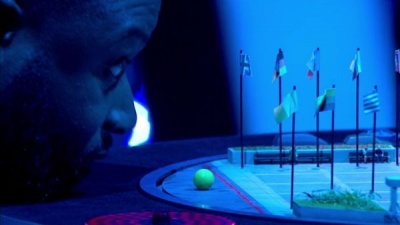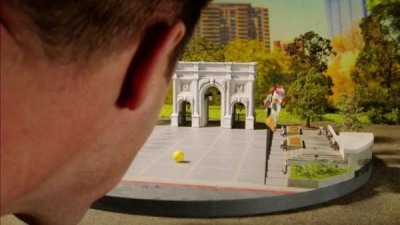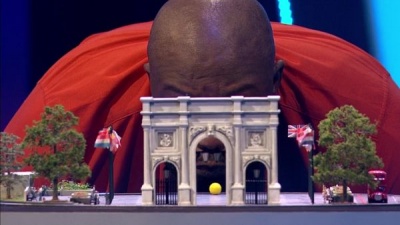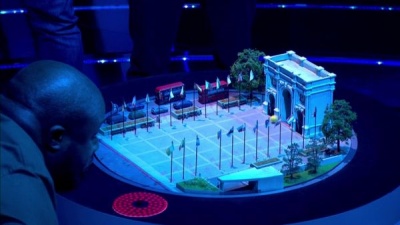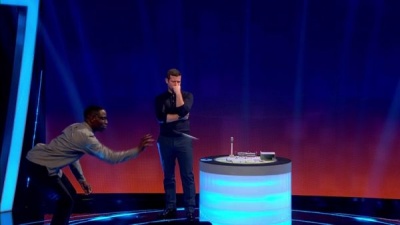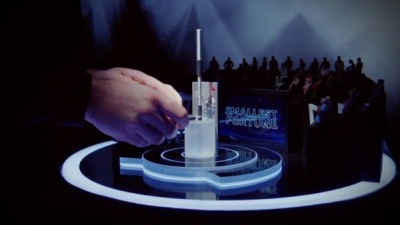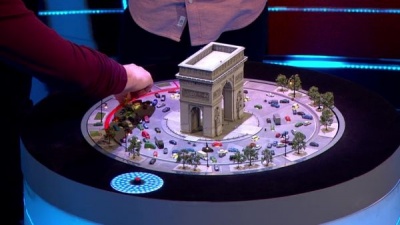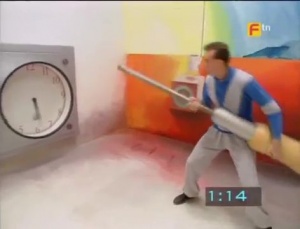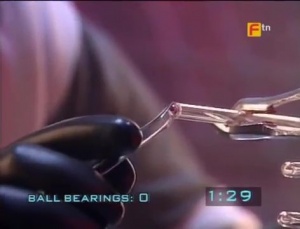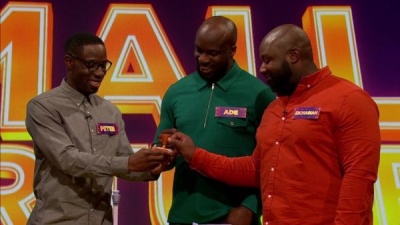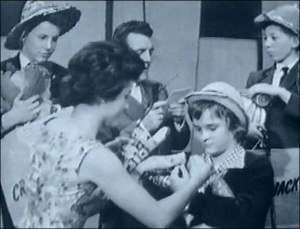Weaver's Week 2019-02-17
Last week | Weaver's Week Index | Next week
Things we learned from Small Fortune:
- Tilt-shift models always look good.
- Dermot O'Leary is always a great host.
- DFS have a sale on.
- BRIAN BLESSED is misplaced.
- Fun to tense and back again only works once in a show.
- Audio description gives away what's about to happen on screen, as we'll demonstrate in picture captions.
Now the full review.
Contents |
Small Fortune
Youngest Media for ITV, from 2 February
Teams of three play this game. The objective is quite simple: complete three tasks to qualify for the final, then win the final to take home the money. There's a potential £150,000 to be won on each episode.
Of course, it's not quite that simple. Each task is a one-shot game: the competitor will either win and keep the money, or will lose and be out of the rest of the show entirely. Lose all the players and your team isn't qualifying for the final; lose the one chance at the final and your team leaves with nothing.
We're reviewing the show after two episodes, both filled with teams of relatively young people – and both filled with teams of young men. Last night's show featured Richard Madeley (first old person) with his daughter Chloe (first woman) and her husband James Haskell.{a}
The concept behind Small Fortune is simple. Do a small task. Here, for instance, is a model of Marble Arch. Here is a marble. All you've got to do is blow the marble through the arch in Marble Arch.
The team decide amongst themselves who will do the task. Their player has a free go, a sighter to work out how easy or hard this challenge is.
Complete it first time? Well done. It counts for nothing, but well done. Mess it up? Well, it was only a trial, but you'll have learned something, and that might help for next time.
The player now has a decision to make. They can go for it right away, put £50,000 into the bank if they succeed. Or they can take a second practice effort, and this will run the bank down by 10% – £5000 for each practice. Demot offers the decision as a question: "Press, or practice?"
More often than not, our player is going to take more practice. They're going to take a lot more practice. And when they're confident enough to go for it, or the prize is so low that they may as well go for it, they'll press a button.
The studio lights dim, all the gold drains away and we're left with just a cold blue outline. All of the white light vanishes from the screen, the player is lit in a dim blue light. And the big voice of BRIAN BLESSED {b} ramps up the tension even further.
"Jonathan! You've practised five times, you've succeeded just twice. Now, for Thirty Thousand Pounds, can you put the ball through Marble Arch?"
The tension has been ratcheted up to enormous levels. Jonathan blows, and within moments we know the result.
And then we have to go through it all again, and again, and again. If Jonathan fails, he goes off to sit on the Sofa of Shame, and cannot play any of the remaining challenges – not in the heats, not in the final. Assuming Jonathan wins, he rejoins the team and can play any of the other challenges.
Once the team's won three challenges, they take that money through to the show's final. The challenge is a little more difficult, to lift a briefcase off a pole without touching the sides. If there's more than one player left in the game, each can have a practice in the final. Again, each practice takes 10% of the prize pot – now, this is closer to £10,000 than £5000.
And yes, it's possible for someone to win money and do nothing more than one practice at the final game. We saw that in the first episode.
Small objects of desire
We surprised ourselves with Small Fortune. "Underwhelming" was our initial reaction, and that's not changed after later episodes. And it's interesting to think about why our reaction is so "meh".
The show does a lot of things well. It's hosted by Dermot O'Leary, one of the greatest television hosts of our time. He's precise, he knows when to push a point and when to step back and let people make their own television. They keep tension: will the contender win on this attempt? Even if they've made two or three successful trials, there's a chance they'll blow the one attempt for real.
Each challenge is introduced to viewers through a video, which succinctly explains how to succeed and how to fail. BRIAN BLESSED explains himself clearly and concisely.
Each challenge looks good, model makers Karen Britcliffe and Mauricio Elorriaga have made an effort with decorations and dressing. The Marble Arch game didn't have to have flags and trees to focus the corridor, but it looks so much better with them present. The studio in the final game doesn't need to have a working video screen, but it does, and we love it. And the first time we see the tension sting, it's wowsome: bright and cheery while they're practising, then suddenly dark and serious when played for real.
In the background, we viewers know what the contestant wants to do. Blow a marble in the right place. Flip something into the bin. Lift a ring up a buzzwire. These are simple games, presented with love.
And that's the nub of the problem. The emotions go up and down, up and down, like a teeny-tiny yo-yo. It's clear where they're practising and what's really important, but there are so many mini-climaxes that we're entirely spent for the big finale.
In our minds, simple and small is closely associated with insignificant and trivial. The lure of big money won't distract us for very long, certainly not for a full hour. We cannot forget that this is a man trying to blow a marble through a hole on primetime television.
Ultimately, we don't think that Small Fortune scales particularly well. Each challenge works in itself, and the idea would work wonderfully as one element in a larger set of challenges. Suppose that there was a variety programme containing music and stunts and guest stars – Small Fortune would be an excellent item in The Dermot O'Leary Saturday Fun Tub.
Or it could work as one element in a show of things on very different scales. This miniaturised area, something done on a human scale, a Land of the Giants challenge, something breathtaking like the driving games from Beat the Star. There's nothing wrong with being small, but too much small doesn't work.
We can compare Small Fortune against other shows. The French version of Fort Boyard has an interlude with "Blanche". Contestants try for their freedom by taking on simple tests of skill. Roll a ball along the length of a plank and drop it into a container, that sort of thing. Easy to explain, easy to follow, and just one brief part of a two-hour programme.
Or we can compare the size of games on The Crystal Maze. There are some fiddly little challenges, designed to test dexterity. Remember the one where they had to feed ball-bearings into a tube by using tweezers? There were many more games with oversized props, such as wiring a giant doorbell using a battery even taller than Richard Osman, or crawling through a giant computer circuit.
Small Fortune concentrates on the little things, and is a lesser programme because of it. That hasn't stopped the show from selling overseas – NBC has bought the format for the lucrative North American market. Viewing figures here have been wobbly, and we think it's a small success; we admire the artistry, but not the show. It's a show for the head, not for the heart.
Countdown Update
Just about a month into the heats, and here are the daily champions.
Brendan Whitehurst was the carryover champion, four wins before Christmas, four in January to complete his octochamp run. A total of 821 points would have made him second seed last series, and he's already a name to watch for the finals week in June.
There were single wins for Adam Davidson, Olwen Evans, and Jimmy Page. Then Kerry Copland won five in a row. That might just prove enough for the final eight, though we'd be surprised if she went further. Misba Sheikh had four wins, and again progress would be a surprise.
At the time of writing, Dorcas Brown is the champion, with two wins. More heats are required.
Charity news. There will be a marathon Countdown match, between Mark Deeks and Zarte Siempre, to run from 9.48pm on 27 February until the end of the month. (26.2 hours: the length of an athletic marathon.) It's organised as part of Mark Watson's Inordinately Long Comedy Gig, in aid of Dementia Revolution. Donations received with massive thanks.
This Week and Next
It's Friday, it's five-to-five, it's The Demon Headmaster! Yes, CBBC is bringing back the iconic cult drama, where the titular villain is Super Head{c} of an academy. How can our heroes fight an antagonist who anticipates their every move? We'll find out in the next academic year. But it's not a game show.
Other commissions for CBBC include series *seven* of The Dog Ate My Homework. Good grief, The Fabulous Iain Stirling's panel game is now old enough to collect homework of its own. Can You Kick It? is back, please contain your excitement. Sam and Mark will also host a revival of Crackerjack. Ask yer grandparents.
Seriously, the BBC are bringing back Crackerjack after 35 years. With Sam and Mark's immense talents, this had better be the variety extravaganza from the 1970s, not the Stu Francis pop 'n' slop from the 80s. And we hope that it's going to premiere on CBBC on Friday evening, then get a repeat on BBC1 at teatime on Saturday. The schedule could be Sam and Mark's Crackerjack, then Pointless Celebrities, and then Strictly Come Dancing. Chop out Xander and Richard, if they're feeling really brave.
BARB ratings in the week to 3 February.
- Call the Midwife remains the most seen show on television (BBC1, Sun, 8.9m). Dancing on Ice is still the top game (ITV, Sun, 6.4m).
- Next come The Voice (ITV, Sat, 5.85m), The Chase (ITV, Wed, 4.45m), and Pointless Celebrities (BBC1, Sat, 4.4m). Brightest Family came back for a new series and found success (ITV, Wed, 3.52m).
- Two shows not doing terribly well: The Greatest Dancer (BBC1, Sat, 4.2m), down a million on its first episode. Small Fortune (ITV, Sat, 3.50m) underperformed, especially as it was hammocked between The Voice and The Rugby (both over 5.8m). Can we conclude that Dermot O'Leary is less popular than Anne Hegerty?
- Top on BBC2 was Dragons' Den (Sun, 2.65m), with Only Connect (2.55m) beating University Challenge (2.4m). Hunted was Channel 4's top game show (Thu, 2.45m).
- On the multi-channels, A League of Their Own (The Satellite Channel, Thu, 945,000), new Shipwrecked (E4, Mon, 820,000), and Hell's Kitchen (ITV2, 595,000).
Half term week on the schedules, and almost nothing new. Rhannu (S4C, Wed) is the one new thrill, locking 16 people in a shed. Next Saturday has the last in the "present" series of The Greatest Dancer (BBC1), and The Voice hits The Battle Rounds (ITV and VM1).
Footnotes
{a} Throwing a celebrity edition out this week is weird. They could have aired it as the first in the run, use some familiar faces to help us work out an unfamiliar format. Or they could have noted James Haskell as a rugby player, and put his episode out after his England Rugby colleagues play on 9 or 16 March. But no, they burn it off this week. Strange. Back!
{b} That is literally his credit – "Big Voice – BRIAN BLESSED". Back!
{c} Not to be confused with the villain being revived by a spotty man and given a secret magic word. Back!
Photo credits: Youngest Media, Chatsworth Television, BBC tv.
To have Weaver's Week emailed to you on publication day, receive our exclusive TV roundup of the game shows in the week ahead, and chat to other ukgameshows.com readers, sign up to our Yahoo! Group.


